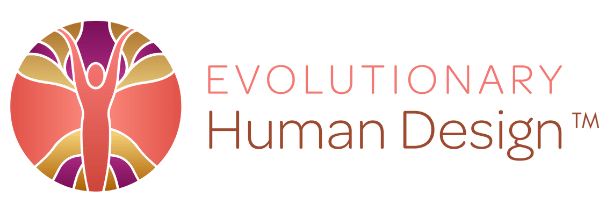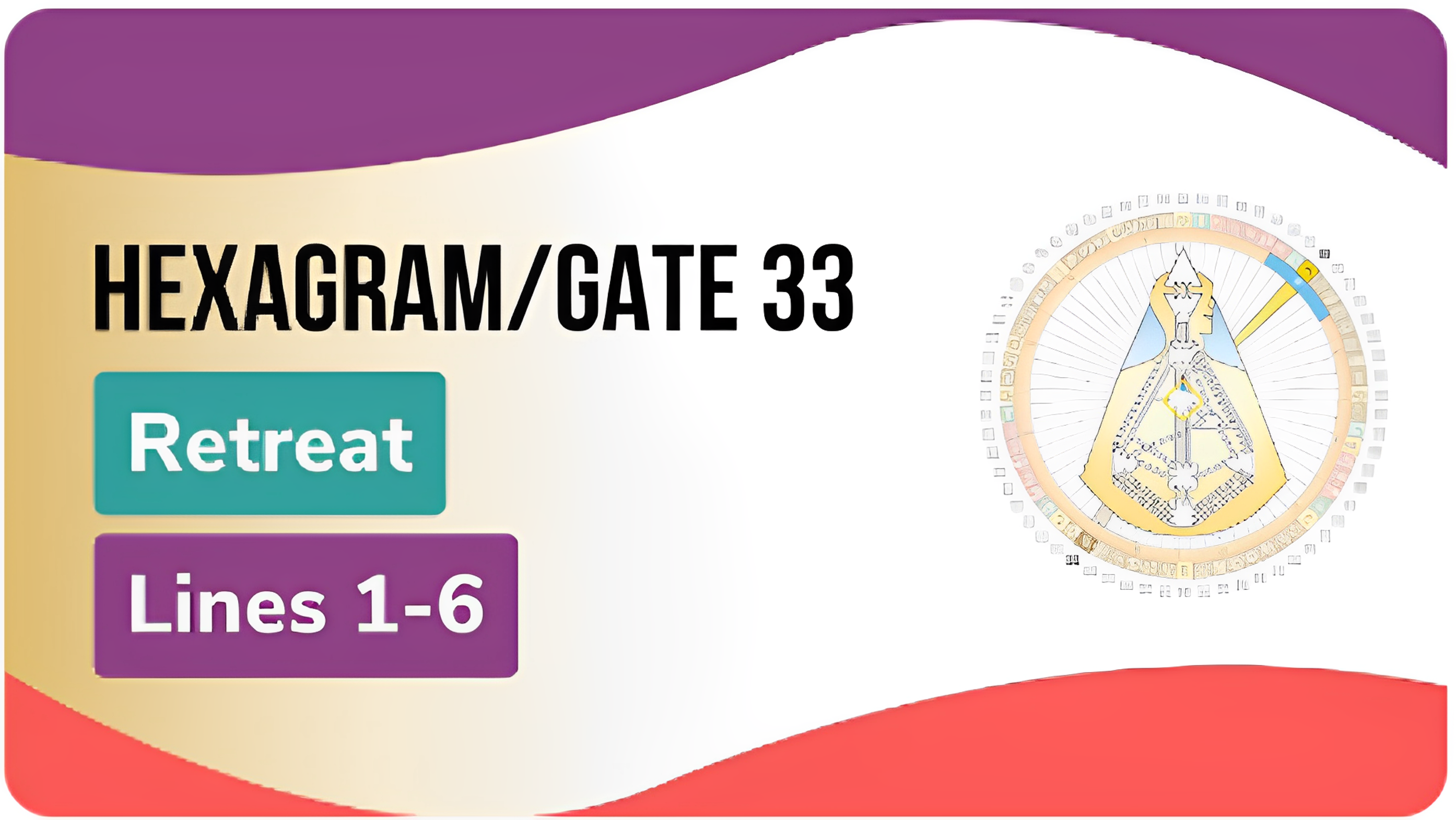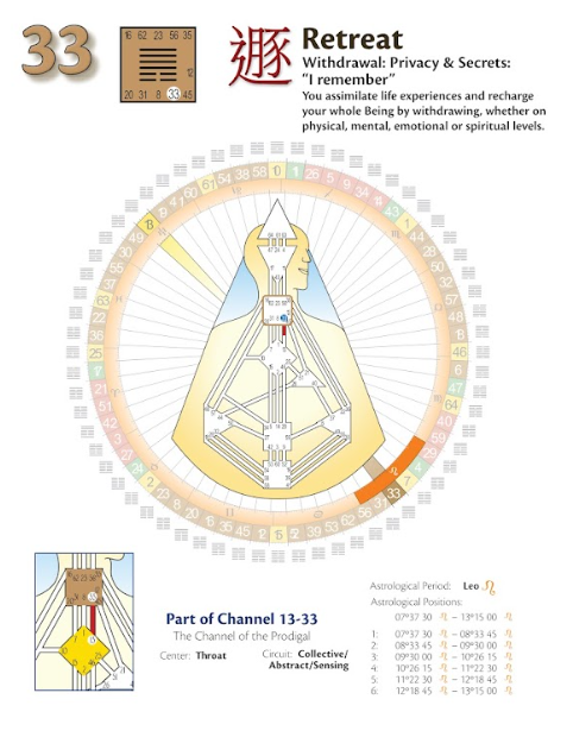Last time, we explored Hexagram 31, which was about the difficulties and responsibilities involved with influencing and being influenced. Now, the sun is moving into Gate 33 in the Human Design Chart, which we call “Retreat.”
The 33 is the last of the gates in the Throat Center for the time being. And each gate in the Throat Center is a voice. The voice of the 33 is a voice of retreat. After expressing the various concepts, ideas, and ideals of the voices that came before it, the 33 represents the conclusion of the experience. It signals a time to go home and work out exactly what it is that we’ve learned and shared; a time to let it all sink in. And that’s what retreat is all about. It’s the voice that gives the story of where we’ve been, what happened, and what it was all about.
Is it a story worth telling? Is it an experience that brought a sense of growth and progress and increase in our lives? Or are we going home with our tail between our legs? And if we choose to withdraw, is that the worst thing in the world? Or can it be an opportunity to grow?
With Gate 33, more happens to you in the course of a day than you can process in a night’s sleep. There’s so much happening all the time and we rarely give ourselves enough time to process it all. You assimilate life experiences and recharge your whole being by withdrawing whether on a physical, mental, emotional, or spiritual level. Sometimes we need to take a step back in order to make the inner connection to everything that’s been taking place in our lives, in order to make sense of it—or to realize it didn’t make much sense at all.
With that in mind, let’s look at Gate 33 in the Human Design Chart line by line:
First Line: Observing
The first line is called “Observing: Remaining calm when there is no advantage in becoming involved.” The voices in the Throat Center are all about expressing things: ideas, concepts, stories, etc., It doesn’t say any action needs to be taken as a result. So here, you’re just observing, not necessarily getting involved if it doesn’t suit you to do so.
If you remember your inner serenity, you have the clarity to commit to an experience, or not. The whole basis of Retreat exists in the difference between getting involved in something from a place of inner serenity and clarity, and just jumping into something because it’s happening in front of you and it seems exciting.
You have the sense to retreat rather than commit to experiences that are destabilizing. This comes down to trusting your own Authority to tell you whether something’s going to knock you off track or not. You have a tendency to rush into situations that have little merit, only to find yourself overwhelmed by them. You want to just jump in and be involved without being really clear on what it is you’re getting involved with. Instead, observe, listen to your Authority. It knows when something is totally wrong for you.
Second Line: Unshakeable
The second line is called, “Unshakeable: Steadfast in your belief that everything works out as it should.” Second lines often find themselves in circumstances where they’re out of their depth. It’s all new to them. They don’t have the sophistication. Rather than be overwhelmed, you can retreat and wait for your own time of strength to come. If you just follow your natural path, life will not put you into something that you can’t deal with.
If you save your energy when you’re not clear on what needs to happen next, you’ll be ready for when the fortunes change. Again, it’s about recognizing when you’re in over your head. If you’re in a situation where you don’t know how to proceed, retreat, save your energy for when you need it. Things are always changing. Your moment will come. And if you haven’t wasted all your energy chasing shadows, you’ll be ready.
By submitting to any beliefs in personal failure, you can lose trust in yourself. There are moments in life where you’re on track with something and then suddenly the light goes out, you start doubting yourself. This is one of the greatest things we all need to accomplish in this time: to recognize what our self-confidence is. It’s an inside job. Nobody can give us self-confidence. The more we align with our Human Design Chart, the more we see exactly what needs to come through us. If you trust in that, rather than someone else’s suggestions or expectations, there’s no room for self-doubt.
Third Line: Disconnecting
Third lines are always on the fence about whether or not they want to fully commit to something. And here, the third line is called, “Disconnecting: The uplifting sense of quick recovery when you retreat.” Putting aside any fears and anxieties, you realize the advantages in retreating.
We’ve all gone through situations in life where we felt coerced. We’ve felt pushed or pressured. Where people are telling us we “should” do this, or we’re “supposed” to do that. It’s such a relief to realize that you don’t actually have to be involved in it at all. What a weight off your shoulders.
Your expansive nature recognizes the great benefits in having time to yourself, but your personal compulsion to be private at any cost will easily estrange others. There’s a tendency with third lines, even a habit, of just saying “Count me out. I’ve had it. I don’t want to be involved.” But the thing with the 33rd gateway is that, yes, it’s about retreat, but it’s not about disappearing, it’s not about quitting. It’s about observing. And you can’t do that if you simply walk away and wash your hands of the whole thing.
Fourth Line: Detaching
The fourth line is called, “Detaching: Avoiding unnecessary constraints.” The fourth line is a very particular line here. It has the potential to access different timeframes. Now, I’m not saying it’s a given that you can definitely see into different timeframes. But you might find yourself sitting with somebody and suddenly you get a glimpse of a completely different age, a different lifetime altogether.
You’ll get the sense that this person may be still in living in that lifetime, that every single thing is just a repeat of whatever was going on in that time. But it’s important to stay grounded in the present. It’s great to have this connection to other timelines, but if you lose touch with the present, you can be swept up in all kinds of confusing scenarios.
Fourth lines sometimes just have the ability to pick up on things on a different frequency. But with that comes concerns about being rejected or misunderstood, which is especially concerning for fourth lines, who are all about inclusion and working together. There’s the fear that if you say these things, people might think you’re crazy. But it’s very important that the fourth line does tell its stories. So, when this line talks about avoiding unnecessary constraints, it’s about finding the right audience. When you don’t have the right audience and you don’t have people that can hear you, retreat, sit back and observe instead.
Watching life on many levels, your inner stillness craves external calm. In the next five or six days, you’ll find yourself wanting peace and quiet. And this can be a dramatic need, it can feel like an urgency to retreat. So, it’s a great time to withdraw, find your sanctuary, your zen garden, your beach, wherever you can be still and quiet in order to absorb and filter whatever you’ve been experiencing.
Fifth Line: Self-protection
The fifth line is called “Self-protection: The independence and clarity to disengage.” Fifth lines are the natural leaders, the natural guides. And as such, they find themselves living in the projections of others. People come to you to solve their problems.
Fifth lines can very easily get distracted trying to fulfill things for other people. You can go overboard for them, feeling that you have to rescue everyone, rather than just giving them the guidance that they actually need. And that’s why the self-protection is necessary. You are either clear in your need for privacy or you lose your poise through being overly helpful.
You sense the importance of privacy and secrecy until the time is right to engage others. Be very clear in yourself. Be aware of this tendency to go overboard for other people. It’s a wonderful thing to be a natural leader, to be able to guide and teach others. But if you’re not doing so from a place of clarity, you’re not helping anyone, least of all yourself. So, tune in and ask yourself, “Does this moment call for me to get involved, or can I just be the observer?”
Sixth Line: Letting Go!
Sixth lines always have the potential overview of everything. They can see all the different nuances of the activities going on around them. They can see all the stories that have been building up. And they can feel this great responsibility to get in there and be involved. So here, the line is called “Letting Go!: Moving on from moment to moment, from one scene to the next.”
All sixth lines will know the potential to be overly involved, or, on the other extreme, overly dismissive. So, the key here is to move from moment to moment. Stay present, stay clear with what it is that this particular moment needs. Being objective, you take care to be refreshed and ready for all new experiences. If the moment doesn’t call for you to get involved, then nothing needs to happen. You’re in retreat, you’re rebuilding your energy for whenever is needed next.
Your bright nature is free from doubts and concerns about letting go of needless burdens. I always liked the image of excess baggage. You go on a trip and realize you’ve overpacked. You’ve only ended up using half of what you brought with you. But the next time you take the trip, you’ve still got too much luggage. And then slowly you realize you don’t need that second and third suitcase. You can actually tune into what’s going to be needed for this trip. And the same thing can be said about the baggage of doubts and concerns. They are needless burdens, and you can just let them go.
Your over-generous nature is unable to completely let go and risks becoming codependent. If you don’t remain clear in yourself, there is always the risk of not being able to fully let go. You want to help, you want to get involved, because you know that you can… But is it correct? Is it right for you? The key to letting go is in coming back into the present tense and being really clear in this moment. What is the story in this moment? Is this something you need to take on, or are you dragging around a whole bunch of excess baggage?
That’s Gate 33. We’ll check in again soon. In the meantime, if you’d like to learn more about how your Human Design Chart informs and shapes your life, get your Free Human Design Report today.




